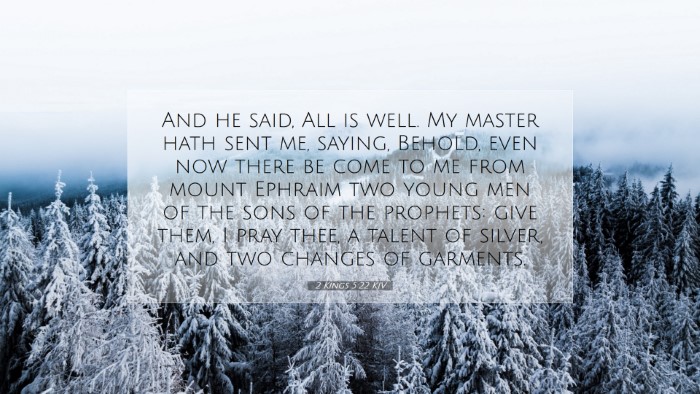Commentary on 2 Kings 5:22
Text of the Verse: "And he said, 'All is well. My master hath sent me, saying, "Behold, even now there be come to me from mount Ephraim two young men of the sons of the prophets: give them, I pray thee, a talent of silver, and two changes of garments."'” (2 Kings 5:22, KJV)
Introduction
This verse occurs within the narrative of Naaman's healing from leprosy and highlights the character of Gehazi, the servant of Elisha. Gehazi's actions and deceit serve as a pivotal moment reflecting both the theme of divine grace and the conundrums of human integrity.
Exegesis of 2 Kings 5:22
The biblical text reveals Gehazi’s dishonest response to Elisha’s previously established principles against accepting gifts after a miraculous healing. Understanding the full implications requires delving into historical, social, and theological contexts.
Contextual Analysis
The overarching narrative of 2 Kings highlights the prophetic activity in Israel, particularly through the ministries of Elijah and Elisha. Naaman, a Syrian commander, is miraculously cured by adhering to Elisha’s instructions to wash in the Jordan River. This act of faith not only leads to physical healing but symbolizes the power of God’s mercy towards the Gentiles.
Character Study: Gehazi
Through Gehazi's actions in this verse, we learn about the dangers of greed and disobedience. His statement, “All is well,” bears the weight of duplicity, reflecting the inner conflict between his role as a servant of God and his personal desires for wealth.
Moral Implications
Matthew Henry notes that Gehazi's lie serves as a cautionary tale for those in positions of spiritual authority. It underscores the peril of allowing materialism to overshadow a commitment to God’s service. Gehazi’s desire for silver and garments speaks to the temptation that many face—the struggle between material gain and faithful stewardship of God’s gifts.
Theological Reflections
Albert Barnes provides insights into the theological implications of Gehazi’s lies. He argues that God’s healing of Naaman was a manifestation of grace, and Gehazi’s seeking personal gain from it tarnished this grace. This narrative illustrates that while God offers redemption freely, the human heart may still resort to deception for personal benefit.
Consequences of Deceit
Adam Clarke emphasizes the eventual consequences of Gehazi's actions, anticipating the dramatic fulfillment of divine justice which would follow. The allure of wealth beckons many to forsake their spiritual integrity, leading to ultimately dire repercussions. Clarke interprets Gehazi’s lie as a precursor to a larger narrative arc—his character development from a faithful servant to a man deserving eventual judgment.
Key Themes
The commentary on 2 Kings 5:22 reveals several profound themes:
- The Nature of True Service: True service to God is unmarred by ulterior motives. Gehazi’s actions illustrate how easily one can turn from genuine ministry to self-serving ambitions.
- Divine Sovereignty and Human Agency: God’s grace is evident in healing Naaman, contrasting Gehazi’s human frailty and failure. This multiplicity of themes displays the dynamics of God’s mercy and human corruption.
- The Danger of Materialism: Gehazi’s desire for material possessions leads to moral failure, serving as an admonition against prioritizing wealth over spiritual integrity.
Applications for Contemporary Readers
The message of 2 Kings 5:22 reaches beyond its ancient context, offering rich insights for pastors, theologians, and lay readers alike:
- Integrity in Leadership: Church leaders must strive for authenticity and integrity, eschewing the temptations of wealth and prestige that can undermine their spiritual calling.
- Guarding Against Materialism: Christians today must remain vigilant against material temptations, continually realigning their priorities with a kingdom-focused worldview.
- Understanding Grace and Judgment: This passage can remind us of the dual reality of divine grace offered through Christ and the seriousness of straying from that grace into self-deception.
Conclusion
2 Kings 5:22 stands as a powerful narrative of caution and reflection. Gehazi’s duplicity exposes the vulnerabilities inherent in the human heart, even within those called to serve God directly. The insights from the public domain commentaries of Matthew Henry, Albert Barnes, and Adam Clarke help frame a deeper understanding of integrity, grace, and the ramifications of deceit in the life of faith. As we reflect on this scripture, may we be inspired to pursue a life marked by truthfulness and a steadfast commitment to God’s calling.


